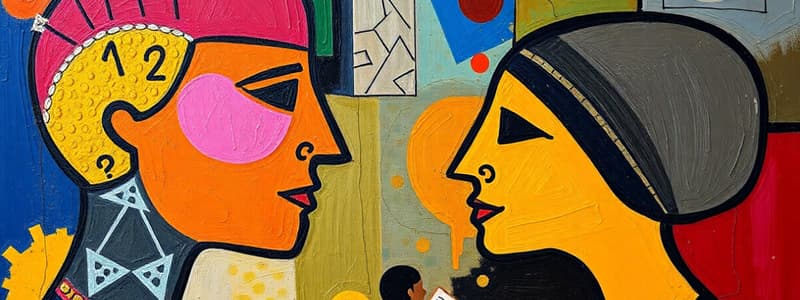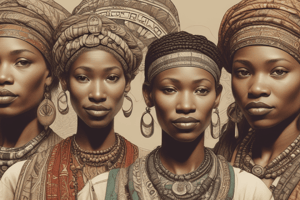Podcast
Questions and Answers
What was the primary impact of the 1965 Immigration Act?
What was the primary impact of the 1965 Immigration Act?
- It established quotas based on race for immigrants.
- It restricted the immigration of people from European countries.
- It enforced strict residency requirements for immigrants.
- It allowed more immigration from non-European countries. (correct)
Which concept describes the overlap of multiple aspects of identity such as race, gender, and class?
Which concept describes the overlap of multiple aspects of identity such as race, gender, and class?
- Positionality
- Cultural Identity
- Intersectionality (correct)
- Ethnicity
What does BIPOC stand for?
What does BIPOC stand for?
- Basic Income for People of Color
- Black, Indigenous, and People of Color (correct)
- Biological Identity of People of Color
- Black Individuals Promoting Open Change
What is the primary defining factor distinguishing race from ethnicity?
What is the primary defining factor distinguishing race from ethnicity?
Which ruling ended the legal bans on interracial marriage in the U.S.?
Which ruling ended the legal bans on interracial marriage in the U.S.?
What term is used to describe the legal status that defines an individual's rights and responsibilities within a country?
What term is used to describe the legal status that defines an individual's rights and responsibilities within a country?
Which phrase refers to unfair advantages granted based on identity characteristics?
Which phrase refers to unfair advantages granted based on identity characteristics?
What concept explains how society and culture create definitions and categories for racial identity?
What concept explains how society and culture create definitions and categories for racial identity?
What does the term 'mixed race' refer to?
What does the term 'mixed race' refer to?
Which of the following best explains the role of the Third World Liberation Front?
Which of the following best explains the role of the Third World Liberation Front?
Flashcards
Ethnic Studies
Ethnic Studies
The study of race, ethnicity, and identity to understand inequality and promote social justice.
Social Construct
Social Construct
An idea created by society, not biology.
Race
Race
A social construct based on physical traits like skin color.
Identity
Identity
Signup and view all the flashcards
Intersectionality
Intersectionality
Signup and view all the flashcards
Ethnicity
Ethnicity
Signup and view all the flashcards
Citizenship
Citizenship
Signup and view all the flashcards
BIPOC
BIPOC
Signup and view all the flashcards
Origins of Race
Origins of Race
Signup and view all the flashcards
Social Identity Groups
Social Identity Groups
Signup and view all the flashcards
Study Notes
Unit 1: Identity Formation
- Ethnic Studies: The study of race, ethnicity, and identity to understand inequality and promote social justice.
- 1965 Immigration Act: Changed immigration rules, increasing immigration from non-European countries.
- 1790 Naturalization Act: Limited citizenship to "free white persons."
- Anti-Miscegenation Laws: Banned interracial marriages.
- BIPOC: An acronym for Black, Indigenous, and People of Color.
- Citizenship: Legal status in a country, determining rights and responsibilities.
- Class: A person's social or economic group.
- Culture: Traditions, beliefs, and behaviors shared within a group.
- Dialogue Principles: Rules for respectful conversations.
- Ethnicity: Shared culture, language, or ancestry.
- Eugenics: A pseudoscience used to promote racial discrimination.
- Externally vs. Internally Constructed Identity: How society defines someone versus how they see themselves.
- Hispanic vs. Latino: Terms with different meanings and usage depending on region and heritage.
- Identity: The qualities that make a person who they are.
- Intersectionality: The interconnected nature of social categorizations such as race, class, and gender.
- Loving v. Virginia: Supreme Court case that struck down laws prohibiting interracial marriage.
- Minority: A smaller group with less power or influence in society.
- Mixed Race: People with more than one racial background.
- Nationality: Affiliation with a particular country.
- Origins of Race: That race is a social construct, not a biological one.
- People of Color: General term for non-white racial groups.
- Positionality: Understanding how one's identity might influence their perspective.
- Preferred Nomenclature: Using respectful and appropriate terms when discussing groups.
- Privilege: Unearned advantages based on identity.
- Race: A social construct based on perceived physical traits, like skin color.
- Race vs. Ethnicity: Race is based on physical traits; ethnicity is based on shared culture and heritage.
- Social Construct: An idea created by society rather than dictated by biology.
- Social Identity Groups: Groups based on shared characteristics such as race, gender, or religion.
- Third World Liberation Front: 1960s student group advocating for ethnic studies programs.
- Unearned Privilege: Advantages received due to one’s identity without effort.
- White Privilege: Advantages experienced by white people due to systemic racism.
- Race: The Power of an Illusion: A documentary arguing that race is a social construct.
Unit 1 Key Concepts
- Key Concepts: Race is a social construct, not biologically based. Identity is influenced by external and internal factors, Intersectionality explains the complexities of identity.
Studying That Suits You
Use AI to generate personalized quizzes and flashcards to suit your learning preferences.



